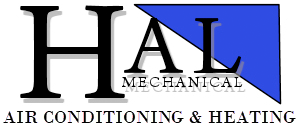Refrigerant leaks are a common problem in cooling systems, such as air conditioners and refrigerators, and can lead to reduced performance, increased energy consumption, and environmental damage. Understanding how these leaks develop and taking preventive measures is crucial for maintaining the efficiency and longevity of your cooling equipment while minimizing their impact on the environment. With this in mind, we at Hal Mechanical would like to discuss the causes of refrigerant leaks and provide tips on how to prevent them.
What Causes Refrigerant Leaks in HVAC?
Refrigerant leaks can occur due to various reasons, including:
Poor AC Installation: Incorrect installation practices, such as improper flaring, loose connections, or inadequate brazing, can result in refrigerant leaks right from the start. It is crucial to ensure that installation is carried out by trained professionals who follow industry standards and guidelines.
AC Wear & Tear: Over time, the components of cooling systems can degrade, leading to leaks. Vibrations, thermal expansion and contraction, and mechanical stress can cause joints, seals, or fittings to deteriorate, resulting in refrigerant leakage.
Corrosion: Corrosion is a significant cause of refrigerant leaks, especially in older systems or those installed in corrosive environments. Exposure to moisture, salt, or chemicals can lead to the corrosion of copper pipes or coils, resulting in leaks.
Can You Prevent a Refrigerant Leak?
Now let’s explore some preventive measures to minimize refrigerant leaks:
Routine AC Maintenance: Implementing a routine maintenance schedule is crucial for identifying and addressing potential issues before they develop into major problems. Professional technicians should inspect the cooling system periodically, checking for leaks, loose connections, and any signs of wear and tear.
Proper AC Installation: Ensure that cooling systems are installed correctly by certified technicians who adhere to industry standards and guidelines. This includes proper sizing of equipment, adequate brazing and sealing techniques, and thorough pressure testing to detect leaks before commissioning the system.
Use of Quality AC Components: Opt for high-quality components, such as copper pipes, fittings, and seals, that are resistant to corrosion and wear. Investing in reliable and durable materials can help prevent leaks and extend the lifespan of the cooling system.
Regularly Inspect & Repair Seals: Rubber seals, gaskets, and O-rings can deteriorate over time, leading to refrigerant leaks. Inspect these components periodically and replace them if any signs of wear or damage are detected.
Avoid Physical Damage to AC Unit: Be cautious when handling cooling equipment to prevent accidental damage. Avoid hitting or bending the pipes, coils, or other components, as this can cause leaks. Additionally, protect the system from extreme temperatures, impacts, or any other potential sources of physical damage.
Educate Users & Maintenance Personnel: Promote awareness and educate users and maintenance personnel about the importance of leak prevention and the proper handling of cooling systems. Encourage them to report any signs of leaks promptly and ensure they are aware of the potential environmental impacts associated with refrigerant leakage.
Recover & Recycle Refrigerant: When servicing or disposing of cooling systems, ensure that refrigerant is properly recovered and recycled. Improper disposal can lead to the release of harmful substances into the environment. Work with qualified professionals who adhere to proper refrigerant handling procedures.
Central Air Conditioning Services in Aliante, Centennial, Desert Shores, Eldorado, Enterprise, Green Valley Ranch, Henderson, Lone Mountain Village, North LV, Peccole Ranch, Paradise, Silverado Ranch, Spring Valley, Summerlin, Sunrise Manor, Tuscany Village, Whitney, Winchester & Las Vegas Nevada
By understanding the causes of refrigerant leaks and implementing preventive measures, you can minimize the risk of leaks in your cooling systems. Regular maintenance, proper installation, use of quality components, and promoting awareness among users and maintenance personnel are key to preventing leaks and ensuring the efficiency and environmental sustainability of cooling equipment. Remember, a proactive approach to leak prevention not only saves you from unnecessary expenses but also helps protect our planet. Call us today!






